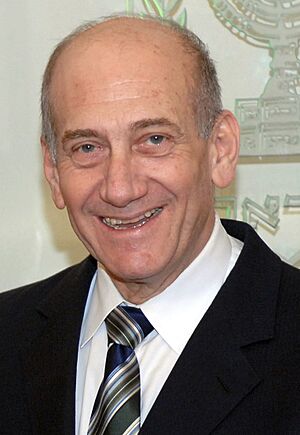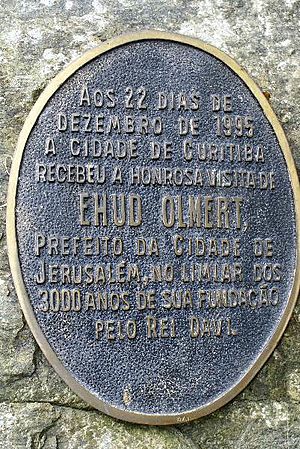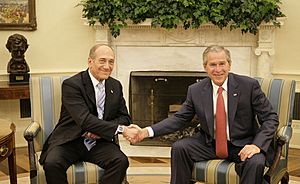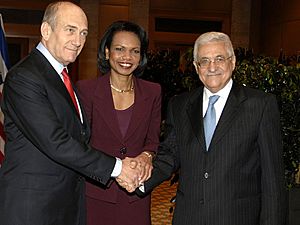Ehud Olmert facts for kids
Quick facts for kids
Ehud Olmert
|
|
|---|---|
|
אֶהוּד אוֹלְמֶרְט
|
|

Olmert in 2008
|
|
| Prime Minister of Israel | |
| In office 14 April 2006 – 31 March 2009 |
|
| President | Moshe Katsav Shimon Peres |
| Deputy | Tzipi Livni |
| Preceded by | Ariel Sharon |
| Succeeded by | Benjamin Netanyahu |
| Deputy Prime Minister of Israel | |
| In office 27 February 2003 – 14 April 2006 |
|
| Prime Minister | Ariel Sharon |
| Preceded by |
|
| Succeeded by | Tzipi Livni |
| Mayor of Jerusalem | |
| In office 2 November 1993 – 16 February 2003 |
|
| Preceded by | Teddy Kollek |
| Succeeded by | Uri Lupolianski |
| Ministerial roles | |
| 1988–1990 | Minister without portfolio |
| 1990–1992 | Minister of Health |
| 2003–2006 | Minister of Industry, Trade and Labor |
| 2003–2005 | Minister of Communications |
| 2005–2006 | Minister of Finance |
| 2006 | Minister of Welfare |
| Faction represented in the Knesset | |
| 1973–1998 | Likud |
| 2003–2005 | Likud |
| 2005–2009 | Kadima |
| Personal details | |
| Born | 30 September 1945 Binyamina, Mandatory Palestine |
| Political party | Likud (1973–2006) Kadima (2006–2015) |
| Spouse | Aliza Olmert |
| Children | 4 (including Shaul and Dana) |
| n.b. | |
Ehud Olmert (born 30 September 1945) is an Israeli politician and lawyer. He served as the prime minister of Israel from 2006 to 2009.
Olmert was first elected to the Knesset (Israel's parliament) in 1973. He was a member of the Likud party. He held several important government jobs. These included Minister of Health and Minister of Industry, Trade and Labor. In 1993, he became the Mayor of Jerusalem. He served two terms as mayor.
In 2005, Olmert joined Prime Minister Ariel Sharon in starting a new political party called Kadima. In January 2006, Olmert became the acting Prime Minister. This happened after Ariel Sharon became very ill. Olmert then became the leader of Kadima. He formed a new government after elections in March 2006.
During his time as Prime Minister, Israel was involved in the 2006 Lebanon War. After the war, his popularity dropped. He also worked on peace talks with the Palestinians. This included the 2007 Annapolis Conference. He left office in 2009.
Contents
About Ehud Olmert
Ehud Olmert was born in 1945 in Binyamina, which was then part of Mandatory Palestine. His parents, Bella Wagman and Mordechai Olmert, moved to Palestine in 1933. His father, Mordechai, later became a politician. He served in the Knesset from 1955 to 1961.
Olmert studied at the Hebrew University of Jerusalem. He earned degrees in psychology, philosophy, and law. He later opened a successful law firm in Jerusalem. He also served in the Israel Defense Forces. He worked as a journalist for the IDF magazine BaMahane.
Olmert is married to Aliza. She is an author and artist. They have four children and an adopted daughter. One of his daughters, Michal, has a master's degree in psychology. Another daughter, Dana, is a literature lecturer.
Political Journey
In 1966, Olmert was a student leader at the Hebrew University of Jerusalem. He was part of the Gahal student group. He was first elected to the Knesset in 1973. He was 28 years old at the time. He was re-elected many times as a member of the Likud party.
In 1988, Olmert became a minister without a specific department. He was responsible for minority affairs. Later, he served as the Minister of Health until 1992.
Mayor of Jerusalem

In 1993, Olmert ran for Mayor of Jerusalem. He won against the long-serving mayor, Teddy Kollek. Olmert was the first Likud member to hold this position. He was re-elected for a second term in 1998. He resigned in 2003 to return to national politics.
As mayor, Olmert worked on many important projects. He improved the education system and road networks. He also started the development of the light rail system in Jerusalem. He invested a lot of money in public transportation.
While mayor, Olmert spoke at a conference in Northern Ireland. He talked about how political leaders can help improve relationships between people. He emphasized that a good political process allows different sides to live peacefully together.
Deputy Prime Minister
Olmert returned to the Knesset in 2003. He became the chief negotiator for the new government. He was appointed as the acting Prime Minister and Minister of Industry, Trade and Labor. From 2003 to 2005, he also served as Minister of Communications.
In August 2005, Olmert became the acting Minister of Finance. He replaced Benjamin Netanyahu. Olmert supported Israel's plan to withdraw from the Gaza Strip. He had once opposed giving up land, but he changed his mind. He said he realized his earlier views were mistaken.
In November 2005, Olmert left Likud. He joined Prime Minister Sharon's new Kadima party.
Becoming Acting Prime Minister
On January 4, 2006, Olmert became the acting Prime Minister. This happened because Prime Minister Ariel Sharon suffered a serious stroke. Olmert and the government decided that elections would still happen in March. Olmert was then chosen as the chairman of Kadima. He became the party's candidate for prime minister.
In his first major speech as caretaker prime minister, Olmert supported the idea of a Palestinian state. He said Israel might need to give up parts of the West Bank. This would help Israel keep its Jewish majority. He also talked about a plan for Israel to withdraw from most of the West Bank. This plan was put aside after the 2006 Lebanon War.
In the 2006 election, Kadima won the most seats. On April 6, President Moshe Katsav asked Olmert to form a government. On April 14, Sharon's term as prime minister officially ended. Olmert then became the country's new Interim Prime Minister.
Prime Minister of Israel

On May 4, 2006, Olmert presented his new government to the Knesset. He became the Prime Minister.
On May 24, 2006, Olmert spoke to the U.S. Congress. He said his government would continue with the disengagement plan if no agreement was reached with the Palestinians. He was the third Israeli prime minister to speak to Congress.
After the 2006 Lebanon War, Olmert's popularity decreased. In May 2007, his approval rating was very low.
In December 2006, Olmert said he could not rule out a military attack against Iran. He called for international action against Iran. He also mentioned Israel as a nuclear power in an interview. He later tried to clarify his statement.
In May 2008, Israel began indirect peace talks with Syria. These talks were arranged by Turkey. Olmert said that resuming peace talks with Syria was important. However, Syria stopped the talks later due to the Gaza War.
Rocket attacks from the Gaza Strip on Israel happened often in 2008. A ceasefire was agreed in June. But attacks increased in November. The ceasefire ended in December 2008. On December 24, more than 60 rockets and mortar shells hit Israel.
On December 25, 2008, Olmert warned Gaza to stop the rocket attacks. He spoke directly to the people of Gaza on an Arabic TV channel. The attacks did not stop. Israel then launched a military operation called Operation Cast Lead on December 27. Air and naval strikes continued for days. On January 3, 2009, Israeli ground forces entered the Gaza Strip. The fighting lasted 22 days until a ceasefire. Israel then withdrew from Gaza.
Resignation
On July 30, 2008, Olmert announced he would not run for the Kadima party leadership again. He said he would resign as prime minister once his party chose a new leader. He stated he was "proud to be a citizen of a country in which a Prime Minister can be investigated like any other citizen."
Many politicians praised Olmert's decision to resign. Foreign Minister Tzipi Livni called it a "correct decision." Defense Minister Ehud Barak said it was "proper and responsible." Opposition leaders called for new general elections.
After Tzipi Livni won the Kadima leadership election, Olmert officially resigned. However, he remained prime minister until a new one was sworn in. This is required by law to prevent a gap in government. Livni tried to form a new government but was unsuccessful. New parliamentary elections were set for February 10, 2009. Olmert remained in power until after these elections.
Post-Premiership
After leaving office, Olmert spoke at various colleges in the United States. In October 2009, he visited Magnolia, Arkansas. He spoke about Israeli farming and technology. He also discussed Israel's view on Iran. He invited Southern Arkansas University to partner with Israel's Hebrew University of Jerusalem.
In 2012, Olmert expressed his opposition to a military strike on Iran. In July 2019, he canceled a visit to Switzerland. This was after he learned he might be questioned about his role in Operation Cast Lead. In February 2020, Olmert held a joint press conference with Palestinian President Mahmoud Abbas. They called for direct talks with the Palestinian Authority.
Olmert supported the Blue and White party in the September 2019 and 2020 Israeli elections. He also supported the Israeli Labor Party in the 2021 and 2022 elections. He became a columnist for Haaretz newspaper.
In 2025, Olmert wrote an article in Haaretz about the Gaza war. He criticized the large number of Palestinian deaths. He also questioned the goals of the Israeli army. He called the Israeli government a "criminal gang." He suggested the war was being prolonged for political reasons.
See also
 In Spanish: Ehud Ólmert para niños
In Spanish: Ehud Ólmert para niños
 | Jessica Watkins |
 | Robert Henry Lawrence Jr. |
 | Mae Jemison |
 | Sian Proctor |
 | Guion Bluford |


